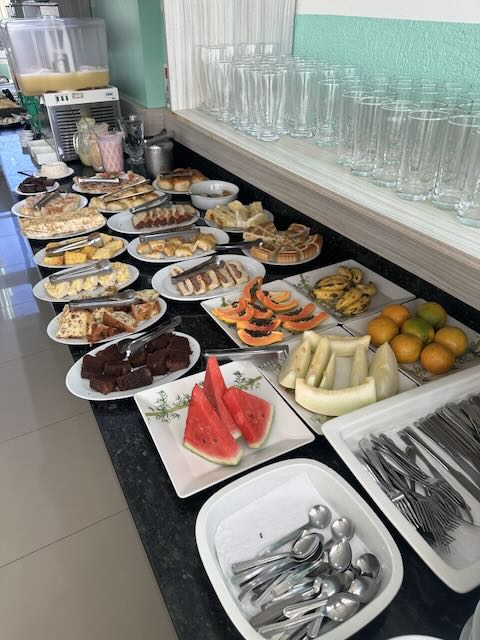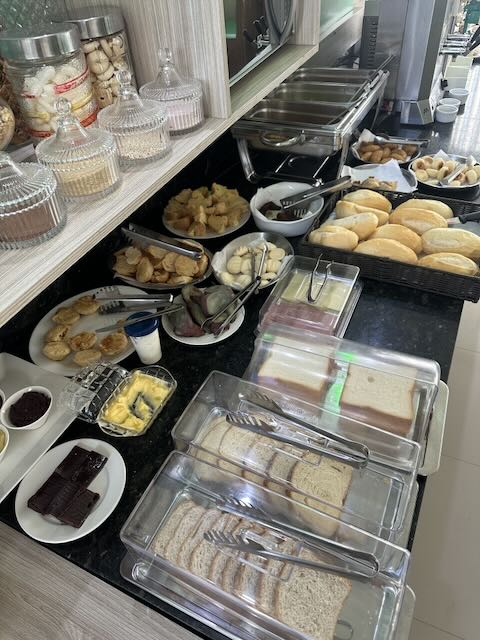Tales from the Trans-Amazonian Highway
Country
After snapping some shots of the crumbling Fordlândia machine shop and the ever-so-famous water tower (really?), I took a quick spin around the backwater town. The rubber groves planted by the Ford dream team? Who knows—maybe they’ve dissolved into the ether, like the ill-designed plan itself. The managers' housing was equally elusive, and frankly, finding it wasn’t a priority. The hospital? Looted and collapsed, a pile of wood scraps and dust from what research told me, so no need to conduct a protracted hunt. I explored the machine shop, saw the water tower, and mediated on Ford’s folly. Mission accomplished. Time to roll.
My friend’s place near Parque Nacional da Chapada Diamantina in Bahia beckoned, a tantalizing 2,612 km away—roughly the distance from New York to Dallas. Google Maps calculated a 24-hour ride. Ha! Spoiler alert: it turned into a grueling nine-day slog, complete with full day a day off the bike. The roads in this vast country are no match for the overly efficient U.S. interstate system. The TransAmazonian stretched ahead, a parade of packed dirt, washboard hell, and cobblestones that rattle your bones to dust. West of Altamira, I would soon find myself choking on a fine layer of moon dust that cloaked everything in a suffocating haze. Brazil is so oversized it should be tossed in a giant washer, cranked through a hot cycle, and shrunk down to something manageable.
The road out of Fordlândia hadn’t changed one bit since yesterday: it was pleasant and still a gravel serpent that kept my speed in check. Soon enough, I hit the Trans-Amazonian Highway BR-230, greeted by a stretch of tarmac that quickly fizzled out into the bumpy chaos that defines this legendary route. I suspect the further west you go, the more the asphalt evaporates into a mirage.
As the afternoon sun dipped, I made a wise choice to call it a day and save the road for tomorrow. Arriving in Rurópolis I consulted with my concierge, Google Maps. The first hotel returned looked promising and quickly turned into a questionable lodging option. The hotel was a grim collection of detention cells, all jungle rot and gloom—a hard pass. A fellow rider had once tipped me off to stay in the center of town, where life, bars, and restaurants can be found. I stumbled upon a serviceable hotel above the bus terminal. Downstairs was the ever-reliable Brazilian buffet, a culinary basics for those in transit that promises satisfaction without too much fuss.
I rounded off the day hand-washing my travel wardrobe, a collection of polyester sports shirts, thin wool socks, and jogger shorts that double as swim trunks. A pannier box served as my makeshift washtub; I strung my damp clothes across cargo straps in the room, letting the air conditioner do its work. If I found myself holed up in a bigger town for a stretch, I might splurge on a laundry service, but that always comes with the hassle of finding the place and dealing with inconvenient schedules. A small bag of laundry powder goes a long way, my friends.
Morning arrived with a cruel twist: a flat tire courtesy of a tiny wire that had embedded itself in the front. The trusty electric pump aded enough air to search for a tire repair shop.
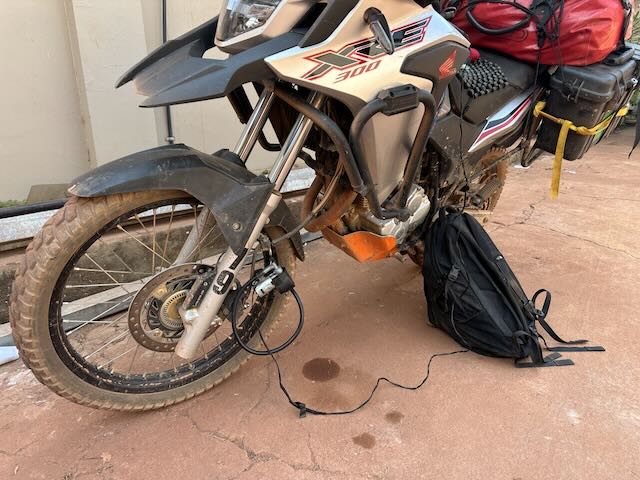
But no sweat—tire repair shops are as plentiful as mosquitoes in this part of the world. Before the journey ended, I’d rack up four flats, each adding either a mundane moment or a tale of how the hell am I going to get out of this one. A nearby motorcycle shop had me in and out, swapping out a bent mirror and adjusting the chain tension—because, at my age, I prefer to leave the finer mechanics to the pros.
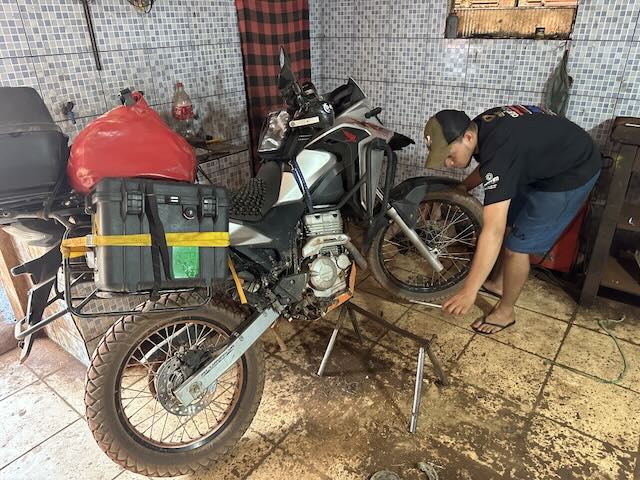
The next few days were a slow-motion grind eastward. Good pavement, bad pavement, and stretches that defied all logic. My trusty bike was light and nimble, but when faced with hours of cobblestone torture, its engineering fell woefully short.
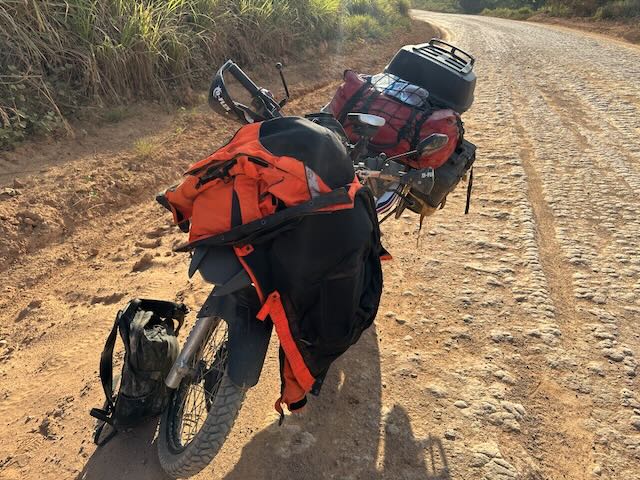
I played a sick game of pothole dodge, searching for the smoothest sections while the road sloped dangerously toward the ditch. One moment of inattention, my front tire dipped into loose gravel at the road’s edge. This will not be good. The bike went down in a quick and sickening spiral, my left elbow smashing into my ribs as I hit the ground. The shift leveler was bent at a rakish angle, and for extra points, the clutch lever was twisted to a new and unique angle. Dusting myself off, I got back on the bike.
The countryside was lush, but the air was still and bone-dry. The dust hung like fog and clung to everything like a bad habit. West of Uruará, it thickened into clouds of moon dust, choking the life out of the landscape. As I plodded along, trying not to drop the bike in the dust, a motorcycle (with riders two up) sped past, casting me a sideways glance that screamed, “Why the hell are you going so slowly?”
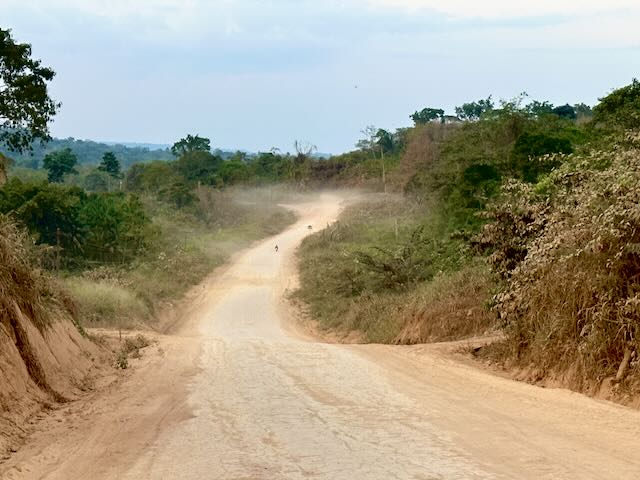
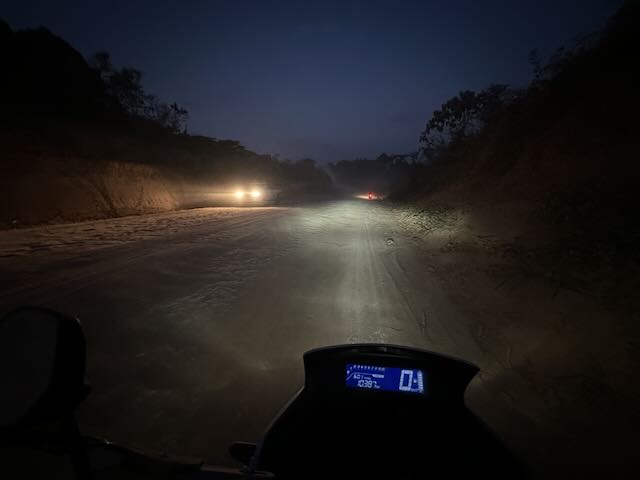
Progress toward Bahia was agonizingly slow. After sunset, I limped into Uruará, finally locating a hotel and further reducing my dwindling cash supply. The several Brazilian bank ATMs were proving obstinate, but after some trial and error, I found one that coughed up cash. It would take weeks for me to adopt the Brazilian way of life, swiping my credit card at every opportunity, learning the hard way that using cash sometimes invites the punishment of a handful of coins.
On Sunday morning, with everything shut tight, I was lucky to stumble upon a mechanic who had stopped by his shop. He straightened out my bent bits, and off I went, only to see the smooth tarmac vanish just a few kilometers east of Uruará. This relentless cycle of tarmac hope followed by disappointment had become a twisted norm.
By late morning, I hit a brief snag: a jackknifed truck blocking the way, a casualty of the smooth dried clay. The driver’s nightmare must have unfolded as his three-trailer rig couldn’t climb a hill. The tires found no grip in the unforgiven terrain, then slid backward. On two wheels, I weaved around the mess like a serpent’s dream, and for a little while I would be free of Brazilian speed demons passing me.
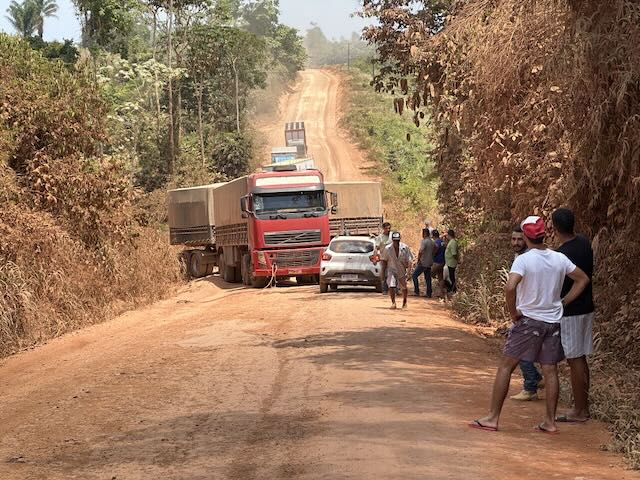
At lunch, I met a motorcycle surgeon commuting to Altamira’s hospital. He had an “antenna” attached to his handlebars, a precaution against a sinister tradition: outlawed kite-flying battles where strings coated in broken glass are used to cut down rivals. I saw the gruesome evidence on his smartphone—deep lacerations stitched by his own hands. It was a reminder that danger lurks everywhere on these roads. I added the item to my shopping list.
The doctor dropped me off at a solid business-class hotel—comfort in an unfamiliar town. After days of dodgy lodging, this was a breath of fresh air. Business hotels here run between $25 and $35 a night, complete with decent Wi-Fi and amazing breakfast buffets that could fuel an army.
